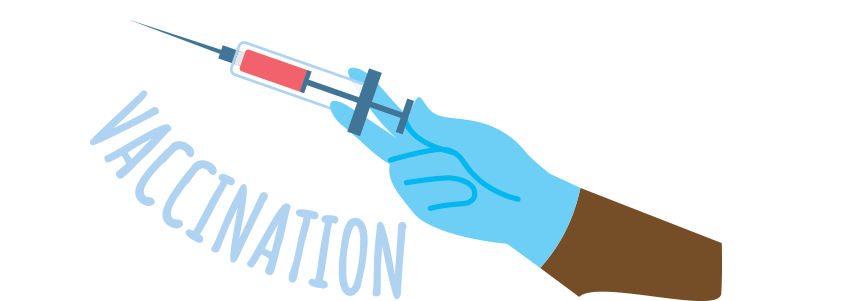Disease prevention
Preventative medicines, such as vaccines or serums, are used to prevent a disease from developing. They allow the body to make specific defences (antibodies) that prevent it from contracting the disease afterwards.
When they are administered systematically to a large number of people, these preventative medicines help to reduce the risk of contagion and the outbreak of epidemics. These medicines have already helped to eradicate some diseases that now no longer exist in the world, such as smallpox.
Some vaccines or serums are now administered worldwide.
These include the measles, polio, diphtheria, tetanus, whooping cough and tuberculosis vaccines. Some of these vaccines are sometimes combined in the same injection, such as the diphtheria, tetanus and whooping cough vaccine. In other cases, it may be necessary to administer several different injections.
Others are reserved for regions where the risk of catching certain diseases is greater.
The yellow fever vaccine consists in a single injection, which is given from the age of 9 months and is effective for life.
The cholera vaccine is given as a single oral dose.
The typhoid vaccine requires an initial intramuscular injection followed by a booster 3 years later.
Lastly, there is a combined vaccine to prevent meningitis A and C that protects a child over 2 years for about three years.
There is also a rubella vaccine, particularly recommended for women of childbearing age, and more recently one for hepatitis B.
In 2021, as a result of the COVID-19 pandemic, an unprecedented collaboration has been established between pharmaceutical companies, health authorities and international organisations to develop several vaccines against COVID-19 in a record time. These vaccines require one to two injections, depending on the type of vaccine chosen.
It is essential to be aware of the risks in the area where you live or travel, and to be informed about preventative measures available to the public

Find out more
The World Health Organisation estimates that the number of deaths from measles fell worldwide by 84% from 550,100 in 2000 to 89,780 in 2016 due to vaccination. However, this number increased by almost 50% between 2016 and 2019. Experts explain that the increase in the number of deaths is mainly due to not enough children being vaccinated, who need to receive 2 doses of the vaccine at the correct time.
Apart from vaccines and serums, there are other forms of preventative medicines.
Anti-allergy drugs are given to people with respiratory, skin or eye allergies to prevent these occurring.
Vitamins and minerals can play a preventative role in health, particularly for infants, young children and pregnant women. For example:
- Vitamin A deficiency can cause serious eye problems and even lead to blindness.
- B vitamins are involved in many functions, such as energy production and the proper functioning of the nervous system.
- Vitamin C prevents scurvy (a disease that is characterised by extreme fatigue, bleeding gums, teeth loss, etc.)
- Vitamin D and calcium to fight bone diseases.
Iron to cure general fatigue and prevent anaemia, which is a serious disorder that mainly affects the blood and primarily impacts women and children